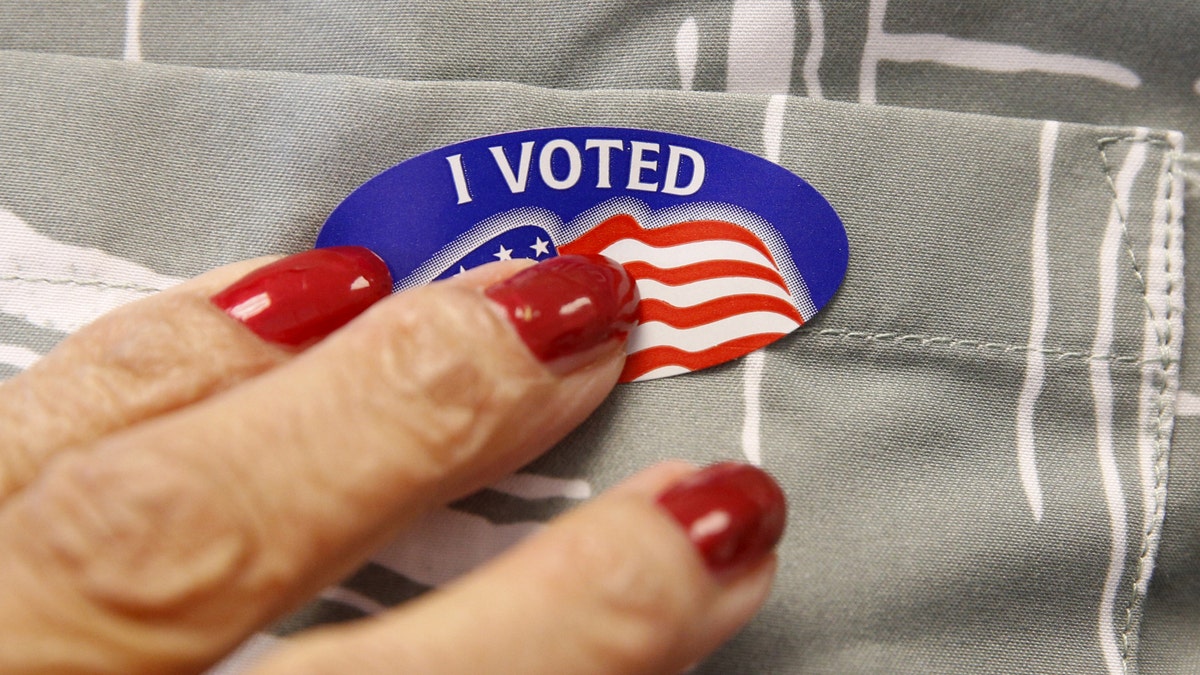
A voter receives a sticker from a polling station worker after he cast his ballot in the Super Tuesday election at Sleepy Hollow Elementary School in Falls Church, Virginia March 1, 2016. (REUTERS/Kevin Lamarque)
On Super Tuesday, American voters will judge their presidential candidates on a variety of issues: Immigration, national security, and tax policy among others. Perhaps more than anything, they’re looking for a positive economic vision signaling better times ahead.
The economic uncertainty of the day gives Republicans a chance to frame the debate in their own terms. The American workplace is a good place to start.
Labor policy typically isn't the first or even fifth topic at a campaign rally—the rise of ISIL and illegal immigration tend to steal the show. Yet Americans aged 25 to 54 spend more time at work during the day than doing any other task — including sleeping, according to the Bureau of Labor Statistics. For working Americans, public policy that impacts the workplace affects their daily lives like few other issues can match.
President Obama and his allies in organized labor understand this, and they've spent the past seven years trying to paint Republicans as out of touch on policies that affect the office, the shop, and the factory floor. We've all heard their talking points: Democrats are for raising the minimum wage. Democrats are for new regulations addressing gender differences. Democrats are for boosting unions.
And these policies are all designed to be difficult for Republicans to oppose. Hillary Clinton and Bernie Sanders have both used them to great effect this year—Sanders in New Hampshire and Clinton soon thereafter. But there is an opportunity for Republican candidates to more effectively address workplace issues: The Employee Rights Act (ERA).
The ERA is the most significant reform to the country's labor laws since the 1940s. Reintroduced by Senate Finance Chairman Orrin Hatch, R-Utah, and House Budget Chairman Tom Price R-Georgia, to protect both union members and the millions of nonunion employees Big Labor aims to organize, the ERA now has more than 110 co-sponsors in Congress—including Sens. Ted Cruz and Marco Rubio.
The bill’s reforms are so common-sense that it might surprise primary voters they're not law already. For instance, the ERA would require all union elections to take place via a federally supervised secret ballot vote—labor organizers can currently circumvent the democratic process by using publicly staged “card check” procedures meant to supplant a private vote. It would also require unions to undergo a periodic re-certification vote to ensure they’re still firmly supported by the workforce. Recent analysis of government data finds that less than 10 percent of current union members ever voted for the union currently “representing” them.
One provision is particularly relevant on Super Tuesday: The ERA would require union bosses to seek employees' permission before using their dues money to support political candidates and causes they might oppose. Roughly 40 percent of union members vote Republican, yet more than 90 percent of union dollars are used to support Democrats and left-wing causes. This is not just a problem; it's an opportunity for pro-employee reform.
Employees are already on board. According to a series of polls from ORC International, the ERA’s key provisions command 80 percent support in both union and nonunion households—and across both political parties. Several provisions—such as secret-ballot strike votes and the federal criminalization of union violence—hover around 90 percent favorability.
It’s all the more reason for Republicans to embrace labor policy as a winning issue in 2016. The ERA is a vehicle to propose specific pro-employee solutions on the campaign trail—before the Democrats craft their own narrative.
If Republicans seize that opportunity, they’ll be very grateful come November.
